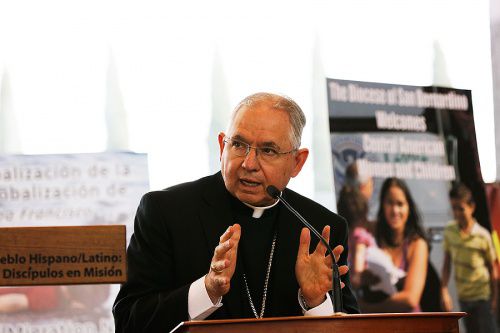Obtaining U.S. citizenship could be life-changing for legal residents in Southern California, and Catholics want to help.
“If we work this year to encourage naturalization and citizenship, this will make a real difference in the lives of hundreds of thousands of people,” Archbishop Jose H. Gomez of Los Angeles said Feb. 27.
“We have to keep concentrating on the 'human face' of immigration reform: the names, the stories, the families. Mothers and fathers, sons and daughters. We need to show that these faces today are no different from the generations of immigrants that came before.”
The archbishop spoke at the second Immigration Summit at the Diocese of Orange's Christ Cathedral in Garden Grove. The annual event focuses on Catholic efforts to help immigrants and is organized by the Catholic bishops of Southern California.
At this year's summit the bishops launched a parish initiative to help thousands of U.S. permanent residents become citizens. The effort will draw on the combined resources of local parishes, Catholic charities, California diocesan administrators and the California Catholic Conference of Bishops.
There are about 2.4 million legal permanent residents in California who are eligible to become naturalized citizens, according to figures from the Department of Homeland Security.
Archbishop Gomez acknowledged the political controversy over immigration in the U.S. He encouraged continued work “to show our neighbors who do not understand the immigration crisis what this broken immigration system is doing to people.”
“Our neighbors are good people. They love this country and they want to do good, they want to do the right thing. But they are confused and frightened,” he continued. “We can help them to understand. We can soften their hearts and change their minds. I know we can.”
Over 400 area leaders attended the summit, and came from over 40 parishes in the Fresno, San Jose and Monterey dioceses.
At the end of the summit, the Catholic bishops and clergy led a procession through the Migrant Stations of the Cross. The special display on the cathedral campus was created with the personal belongings of immigrants. The procession used a special cross that Pope Francis had blessed during his visit to Philadelphia called the Cross of the Encuentros.
Archbishop Gomez asked the gathered leaders to “rededicate ourselves to our people — to their names, their stories, their families.”
He cited Pope Francis’ Feb. 17 homily in Juarez. The Pope had said migrants’ journey is “laden with grave injustices” including enslavement, imprisonment and extortion. The pontiff also denounced human trafficking.
“We cannot deny the humanitarian crisis,” Pope Francis said. He emphasized that the crisis should be measured by the names and stories of those involved, not by statistics.
Archbishop Gomez had a similar focus. “Our struggle has never been about politics. It’s always been about people. People who are hurting and exploited, people who are dying,” he said.
The archbishop lamented the two million deportations in the last eight years. He said the vast majority of these people have been ordinary mothers and fathers and in some cases children.
“We need to be honest with ourselves. Politicians in both parties have let us down and ignored our people’s suffering for their own agendas. This is a moral failure and a human tragedy.”
Archbishop Gomez also spoke about how to respond to those without legal resident status.
“We need to keep calling our neighbors to conversion and mercy,” he continued. “We need to help them see that we are all God’s children and that people don’t lose their humanity when they have an irregular immigration status.”

